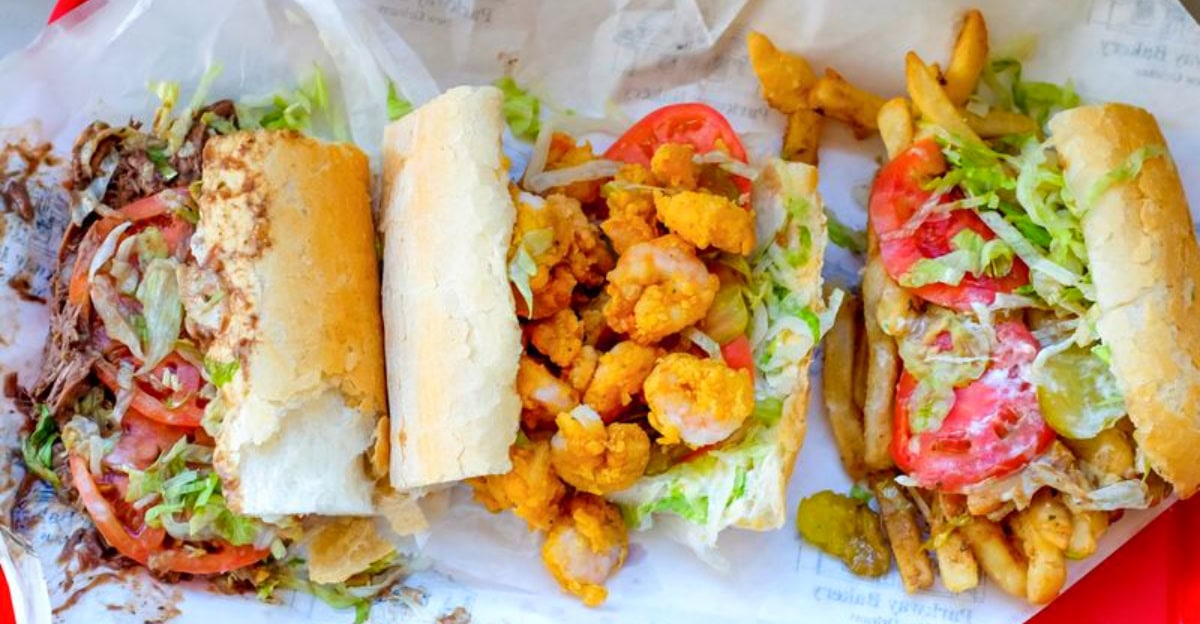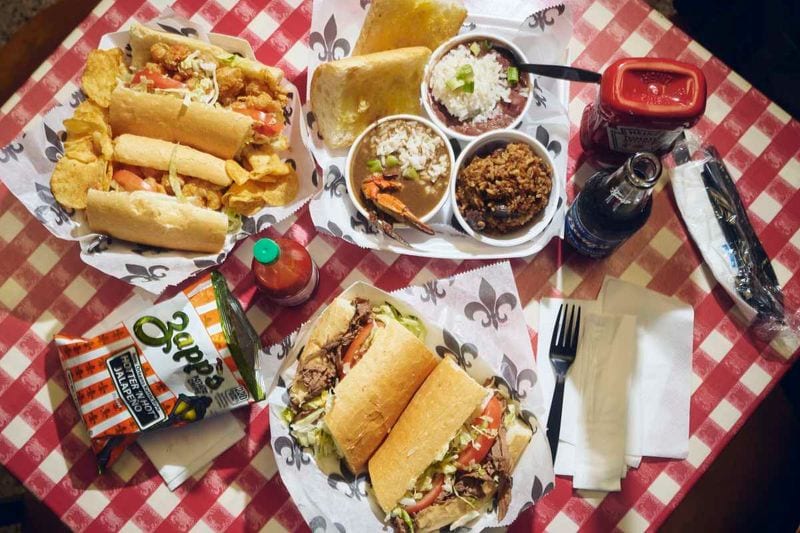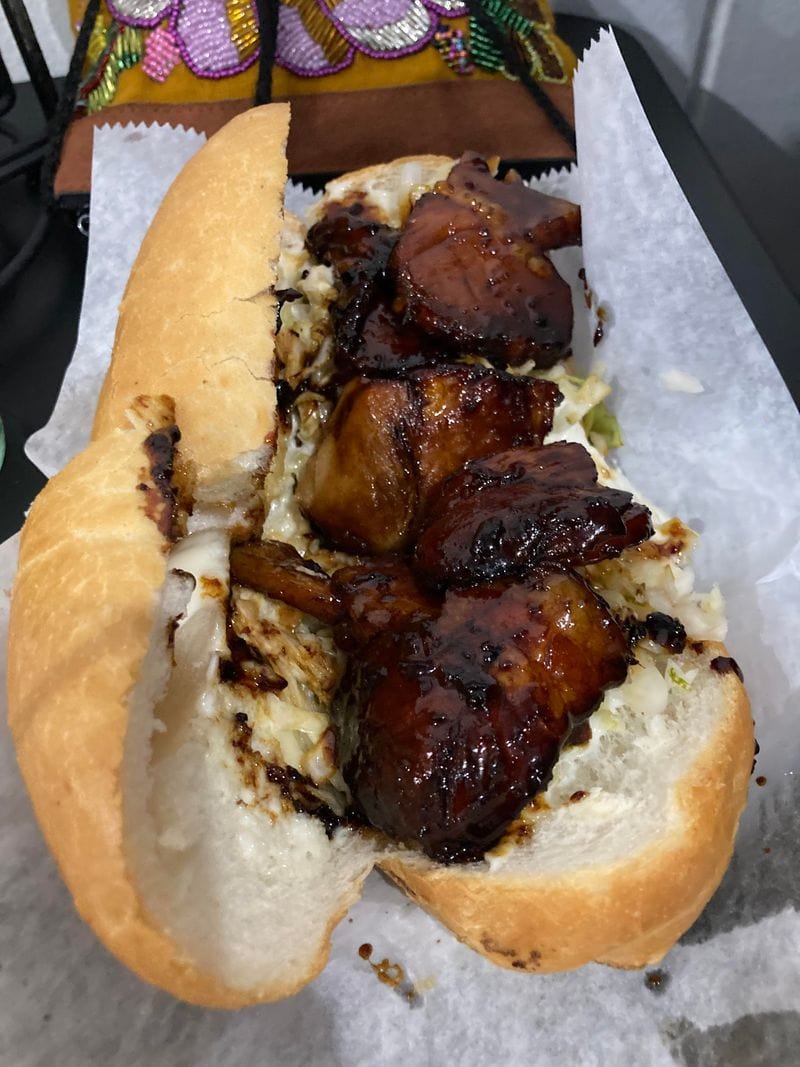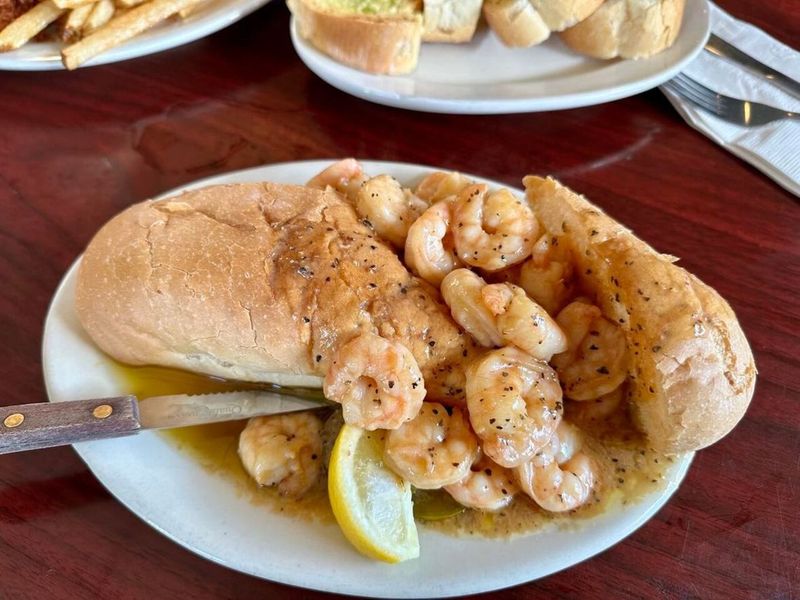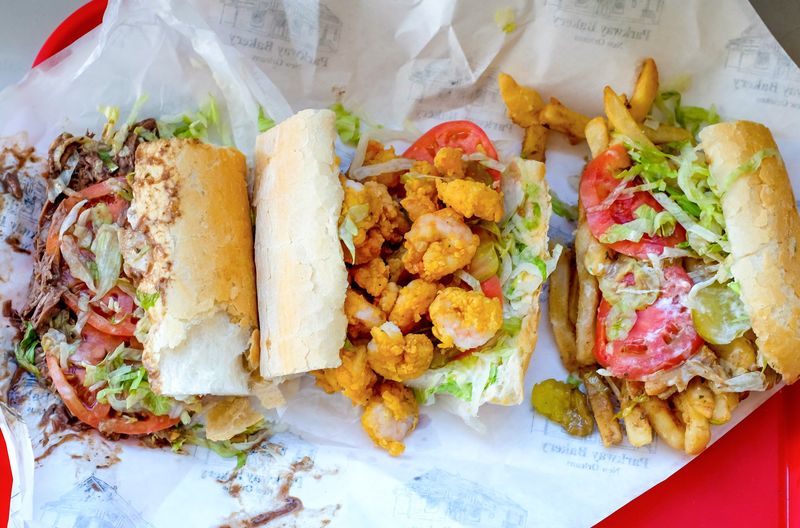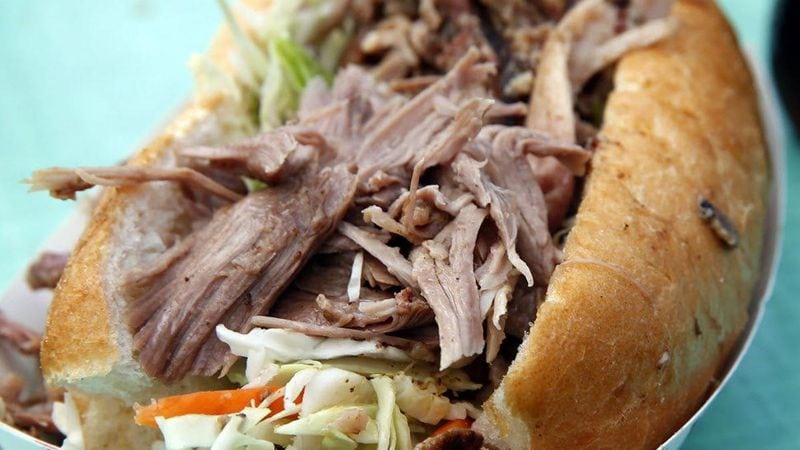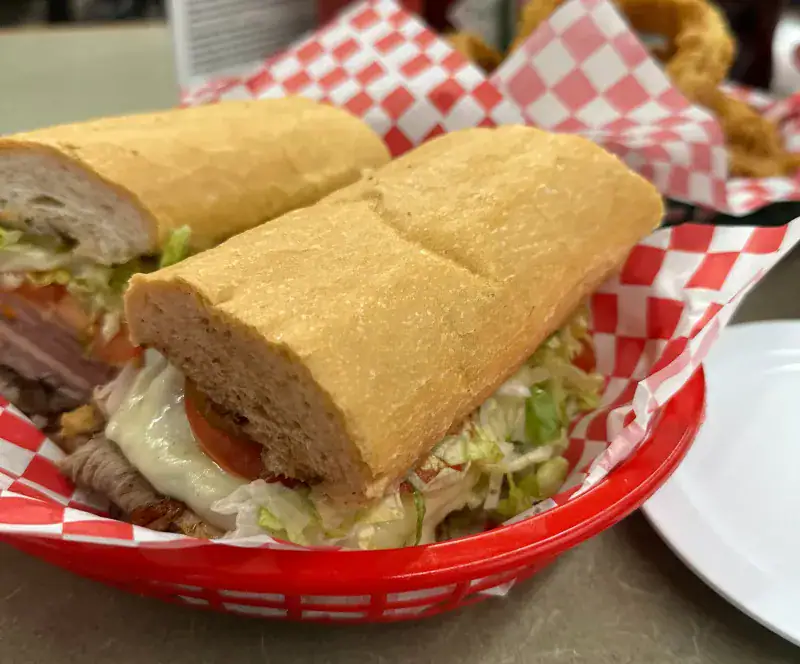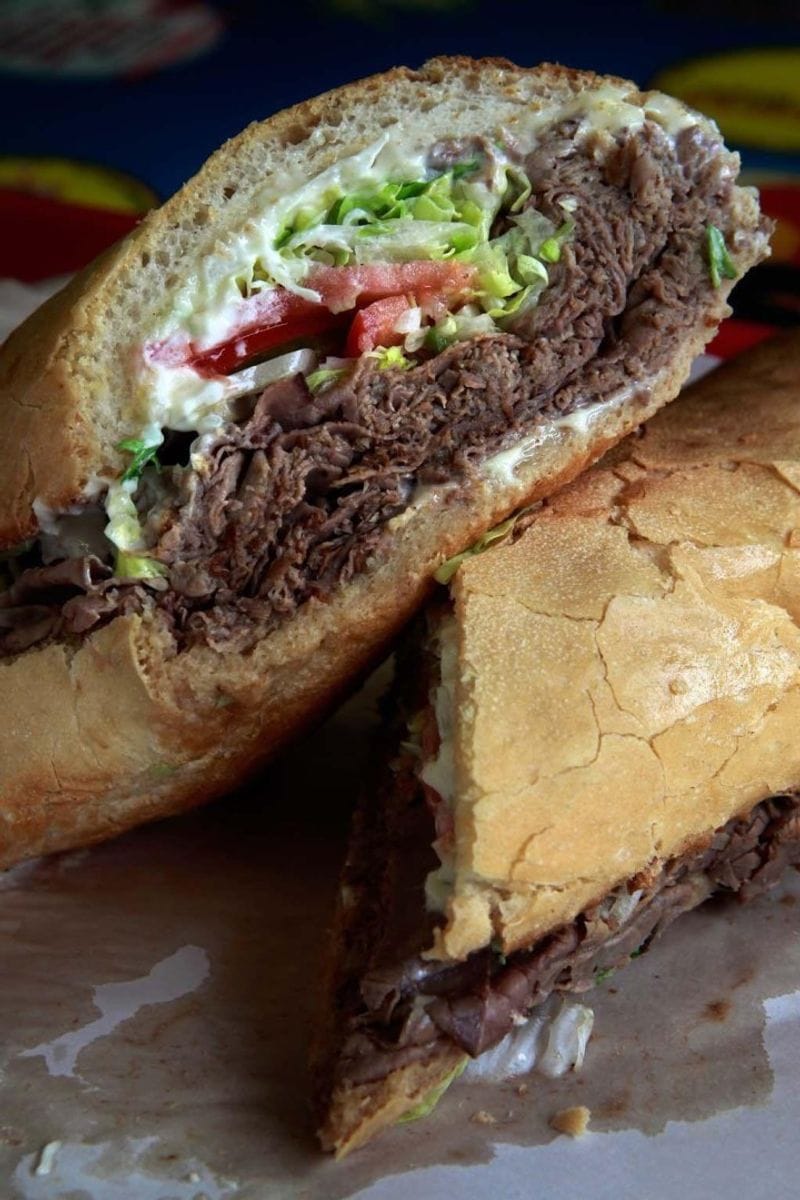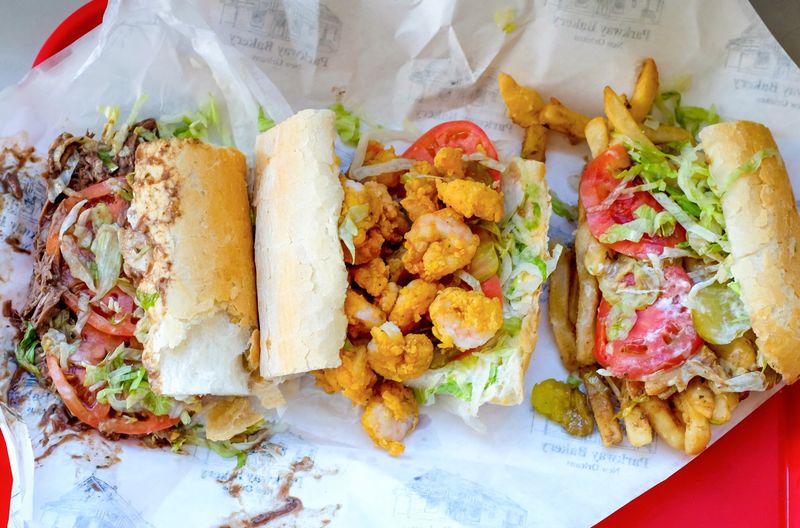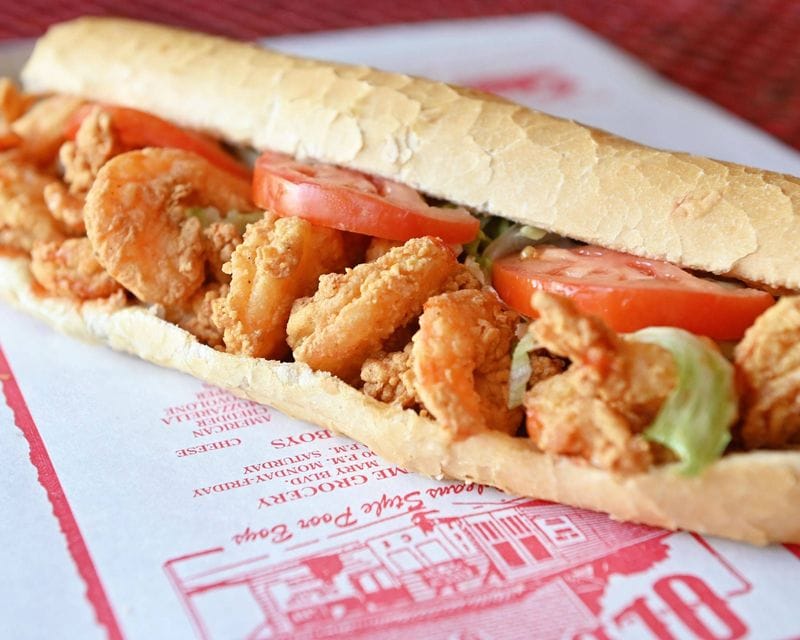Louisiana’s iconic po’ boy sandwiches are more than just fast food—they’re edible history on French bread. From humble beginnings feeding striking streetcar workers in 1929, these overstuffed sandwiches have become a cultural treasure throughout the state. Whether stuffed with crispy fried seafood, dripping roast beef, or creative modern fillings, each shop puts its own special spin on this beloved sandwich.
10. Johnny’s Po-Boys (New Orleans)
Tucked in the bustling French Quarter since 1950, Johnny’s serves up reliable classics amid tourist-filled chaos. The menu sprawls impressively across the wall, offering everything from traditional fried shrimp to hearty roast beef with gravy.
Locals sometimes grumble about the cash-only policy and lines that form during peak hours. Yet the sandwiches deliver consistent satisfaction—crispy seafood, properly dressed, on fresh bread.
The interior hasn’t changed much in decades, with its no-frills counter service and cramped seating. This old-school approach has its charm, though Johnny’s lacks the special touches that elevate the truly exceptional po’ boy shops.
9. Killer Poboys (New Orleans)
Revolution comes between bread at this modern French Quarter gem. Unlike traditional spots, Killer Poboys boldly reimagines the classic sandwich with global influences—think sweet potato and collard green po’ boys for vegetarians or glazed pork belly with Vietnamese accents.
Housed in the back of the Erin Rose bar, this tiny kitchen produces big flavors. The bread comes from local Vietnamese bakeries rather than traditional French bread purveyors.
Purists might scoff at such departures from tradition, but adventurous eaters celebrate these creative interpretations. For those seeking contemporary Louisiana cuisine that respects its roots while pushing boundaries, Killer Poboys delivers a refreshing twist.
8. Liuzza’s by the Track (New Orleans)
Nestled near the Fair Grounds racetrack, this neighborhood joint draws crowds for one legendary creation: the BBQ shrimp po’ boy. Unlike traditional barbecue, these Gulf shrimp swim in a buttery, Worcestershire-spiked sauce that demands extra napkins and possibly a bib.
During Jazz Fest, lines stretch down the block as music lovers seek post-festival sustenance. The garlic-butter-soaked French bread makes the perfect sponge for that rich sauce, creating a messy but memorable experience.
Beyond their signature sandwich, Liuzza’s solid fried oyster po’ boy deserves recognition too. The casual, lived-in atmosphere feels like eating at a friend’s house—if your friend happened to make some of New Orleans’ most craveable sandwiches.
7. Adams Street Grocery & Deli (New Orleans)
College students have been flocking to this unassuming corner store near Tulane University for generations. What appears to be just another neighborhood grocery reveals its true identity at the deli counter in back, where affordable, generous po’ boys emerge with minimal fuss.
The fried shrimp version delivers particular satisfaction—plump Gulf shrimp with the perfect ratio of crispy coating to juicy interior. Their roast beef po’ boy comes properly dressed and drenched in gravy that somehow never makes the bread fall apart.
The store’s weathered exterior and cramped aisles might not impress first-timers. Yet locals know that these no-frills surroundings hide one of Uptown’s most reliable sandwich operations, where quality ingredients matter more than fancy presentation.
6. Walker’s BBQ (New Orleans East)
Hidden in New Orleans East, Walker’s specializes in a po’ boy variety that breaks from seafood traditions—the cochon de lait. Slow-smoked pork shoulder, pulled into tender strands, gets piled high on French bread and topped with tangy, crunchy coleslaw.
The sweet-spicy mustard sauce creates the perfect counterpoint to smoky meat. Family-owned since 1968, this barbecue joint draws devoted fans willing to drive across town for these distinctive sandwiches.
The restaurant itself feels frozen in time, with wood-paneled walls and no-nonsense service. What Walker’s lacks in trendy atmosphere, it more than makes up for with authentic, regional flavor that connects Louisiana’s barbecue and po’ boy traditions in one magnificent creation.
5. Radosta’s (Metairie)
Family traditions shine at this suburban deli where three generations have crafted exceptional sandwiches since 1975. Their house-made Italian sausage po’ boy—a magnificent creation bursting with fennel-scented meat and sweet peppers—offers a welcome departure from seafood standards.
The bread comes from legendary Leidenheimer Bakery, with that distinctive crackly crust and cloud-soft interior. Unlike tourist-focused spots, Radosta’s primarily serves locals who’ve been coming for decades.
The dining area feels charmingly stuck in the 1970s, with vintage wood paneling and red plastic baskets. This unpretentious time capsule represents a vanishing breed of family-owned eateries where recipes are treasured heirlooms and regulars are greeted by name.
4. Bear’s PoBoys (Metairie)
Tucked inside Gennaro’s Bar, Bear’s specializes in the messiest, most decadent roast beef po’ boys imaginable. The meat, slow-cooked until it practically dissolves, swims in a dark, rich gravy that inevitably drips down your arms.
Smart customers request extra napkins and maybe even a fork. The “debris”—those precious bits of beef that fall off during cooking—gets mixed back into the gravy, creating an intensity of flavor that borders on spiritual experience.
While the seafood options satisfy, the roast beef reigns supreme here. The no-frills bar setting, with its neon beer signs and televised sports, enhances the unpretentious charm. This hidden gem proves that sometimes the best food experiences happen in the most unexpected locations.
3. Domilise’s Po-Boy & Bar (New Orleans)
Pilgrims to this weathered Uptown corner spot find themselves in a time capsule of New Orleans culinary history. Since 1918, this family-run institution has been serving legendary fried shrimp po’ boys from behind a worn formica counter under flickering fluorescent lights.
The shrimp arrive perfectly golden, nestled on French bread dressed with just the right amount of mayo, pickles, and hot sauce. Locals debate whether to order the half-and-half (shrimp and oyster combo) instead of committing to just one seafood variety.
The cramped interior, with its mismatched furniture and walls plastered with yellowing photographs, feels authentically unchanged by time. What Domilise’s lacks in polish, it more than compensates for with sandwich-making expertise refined over a century.
2. Parkway Bakery & Tavern (New Orleans)
Established in 1911, this Mid-City institution has served po’ boys to everyone from neighborhood workers to presidents. After surviving devastating flooding during Hurricane Katrina, Parkway returned stronger than ever, cementing its legendary status.
The roast beef po’ boy here achieves perfection—tender meat simmered for hours until it practically melts, served “dressed” with lettuce, tomatoes, pickles, and mayo on Leidenheimer bread. During Lent, their fried catfish po’ boy draws lines around the block.
The historic building, with its weathered cypress bar and outdoor seating near Bayou St. John, provides the ideal backdrop for this quintessential New Orleans experience. Parkway represents po’ boy culture at its finest—unpretentious, generous, and deeply connected to its community.
1. Olde Tyme Grocery (Lafayette)
Beyond New Orleans lies this unassuming Lafayette treasure that many connoisseurs consider Louisiana’s ultimate po’ boy destination. Operating from a former corner grocery since 1982, Olde Tyme’s fried oyster po’ boy achieves sandwich perfection through simplicity and quality.
Fresh Gulf oysters get a light cornmeal dusting before hitting hot oil, creating the ideal crisp-tender balance. The bread—locally sourced and perfectly textured—provides the crucial foundation for this masterpiece.
During lunch rush, University of Louisiana students pack the tiny dining area, cash in hand (no cards accepted). This Cajun country institution proves that sometimes the best food exists outside big-city spotlights. The walls covered with college pennants and local memorabilia tell the story of a beloved community landmark that happens to make transcendent sandwiches.
